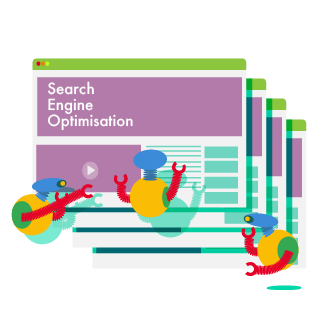To understand what SEO is, we first need to understand search engines. Search engines such as Google and, well…mainly Google, dominate the internet.
Virtually everyone (around 90% of all internet browsers) uses their search engine every single day.
From checking the weather to finding a recipe for dinner or even recommendations on what to watch on television. We turn to Google for pretty much every question that pops into our heads.
Without Google, many of today’s most successful businesses – Amazon, eBay, Netflix – wouldn’t be where they are today.
It’s an essential business ally which is why you need to understand and use it properly.
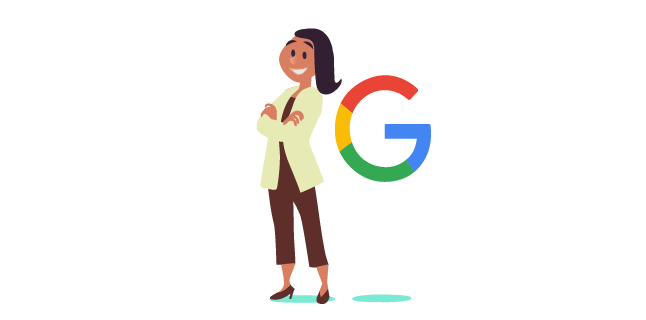
Most businesses construct websites full of content. And, if their content is relevant to a users search query on Google, or other search engines, it will appear near the top of search engine results pages (SERPs).
Optimising your website and its content to gain unpaid, organic traffic and reach the top of the SERPs is known as search engine optimisation (SEO).
SEO is so critical to a brand’s marketing success that it’s impossible not to take it seriously in today’s business world.
If you don’t focus on SEO, your customers won’t find you
It’s like having a grand opening ceremony for a brand new shopping mall, and no one showing up because they don’t know where the mall is, or that it even exists.
SEO lets your prospective customers know that you exist. It makes you easy to find online and will help to increase the numbers of traffic coming to your site.
When you do SEO right, it can (and will) bring you more customers. This in turn, brings more business opportunities, and most importantly – more profits for your business.
By putting in some time and research to develop a solid content marketing plan, there’s no reason why your website can’t appear at the top of Google’s search results.
What Exactly Is Search Engine Optimisation?
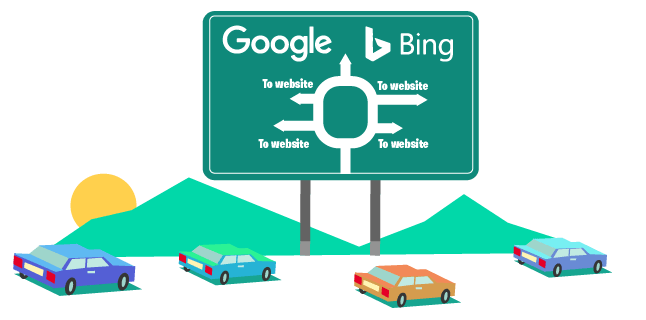
SEO is a branch of marketing which focuses on growing organic (free) visibility on search engines such as Google and Bing.
This is achieved by optimising your website with the intention of ranking higher on search engines for particular phrases that searchers use.
Achieving this requires both creative and technical skills. You need well written content which helps your customers and is SEO optimised for search engines.
People dedicate their careers to content marketing and SEO. And, most companies now have entire marketing departments that work solely on improving organic rankings.
Why does ranking highly matter?
It is vital to your business growth. Ranking highly on Google will give you a higher proportion of search traffic. Which means, you are speaking to more prospective customers.
With that being said, you don’t need to be a huge corporation to do SEO. Anybody can optimise their website for search engines.
The simpler aspects of SEO – such as your website’s written content – is something which you can focus on right away. Whereas, more complex elements, such as technical SEO and backlinking, require a more skilled expertise.
The focus of SEO is on making your website better for search engines to read and use. However, it’s also about improving your visitor’s experience when they land on your site.
In the simplest possible terms, SEO is about increasing the quality and quantity of traffic to your website organically.
Let’s take a look at each of these three elements:
- Quality of traffic – means the right people are visiting your site. High traffic is useless if only a tiny proportion of visitors are interested in your product or service.
- Quantity of traffic – means increasing the number of visitors to your site from search engine results pages.
- Organic traffic – refers to traffic which has come via real search queries, and not from paid advertisements.
The Importance of Being at the Top
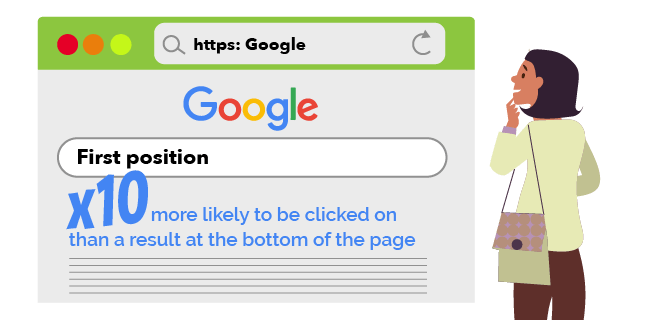
Did you know that a business that appears in first position on a page of search engine results is 10x more likely to be clicked on than a result at the bottom of the page?
Think of how many times you click on a search engine result – excluding the adverts that appear at the top.
How many of them are the first result on the list?
It’s hardly surprising. Google ranks pages in the order of relevance. It places content they view as the most accurate and relevant answer to a search query.
So, we tend to click on the first site that appears in our results pages. This is because it’s probably the most suitable content to answer our query.
It pays to be at the top
If you want to excel at SEO, aim to rank at position one for as many search terms and keywords as possible. This will allow your content to appear in more searches, and benefit from a larger share of the traffic.
Fortunately, SEO is relatively easy to get started with. This is because there are lots of things you can do right away to optimise your site.
However it’s important you know from the start that significant SEO results take a lot of hard work, and most importantly, time. Be prepared to create a lot of quality content and be patient. You’ll need to wait as your results to slowly increase over time as part of your content marketing effort.
Reaching Top Ranks on Google
SEO and content marketing is a process acknowledged as the key way for your website to reach the top of the search engine results.
Content marketing often takes time. It can take months for Google to crawl (read) your content and index it (rank and store it within SERPs).
With a comprehensive SEO strategy, supported with high-quality and valuable content marketing, you will start seeing results in the first few months. But, it could take up to 18 months before you really start to see the growth you want.
How Do Search Engines Work?
The primary function of all search engines is to display relevant websites in response to user-submitted search queries.
For example, if somebody in Newcastle is looking for an electrician, that person may type; ‘Newcastle electricians’ into Google.

Google collates all the results and ranks them in order of relevance.
What determines relevance? In short, a website’s overall design, content relevance, SEO and the quality of content.
Electricians in Newcastle with the most effective website design, the best SEO strategy and high-quality content will be more visible on Google.
Search engines work in two ways: crawling and indexing; and proving a ranked list of results.
1. Crawling & Indexing
Search engines use ‘crawlers’ – robots using algorithms – to go out and new or updated links which lead to webpages.
When the crawlers find a webpage, they scan the page’s code and store bytes of information in its databases. These are retrieved later in order to display results for a search query.
Crawlers go from webpage to webpage, following the URLs and storing data. The data is retrieved when a searcher seeks information and it matches their query.
This is a monumental task, which involves billions of pieces of data. As well as thousands of pieces of information being processed every second. Google demands that results from webpages are displayed immediately to satisfy the end user’s intention.
This is why even a short one or two-second delay from your website can drop your rank down the search results.
2. Providing a Ranked List of Results
Incredibly, in a matter of seconds, Google returns a list of websites which are relevant to a search query. The listed sites are ranked according to their relevance and quality.
When search engines like Google first established ranking was much easier than it is now. For pages to appear at the top of search results, they just needed high instances of keywords on their webpages.
Today, there are now over two-hundred individual factors and variables which influence these algorithms. This is what makes SEO a vastly complex and intricate field.
To be successful with your SEO, you now need to have relevant content that fulfils your searcher’s intent. As well as a fully optimised site which delivers a great user experience.
Why Do I Need to Care About SEO?
Whether it’s Google, Yahoo or Bing, the majority of any online business’ traffic now comes through search engines. In fact, a whopping 93% of all web traffic comes through search engines.
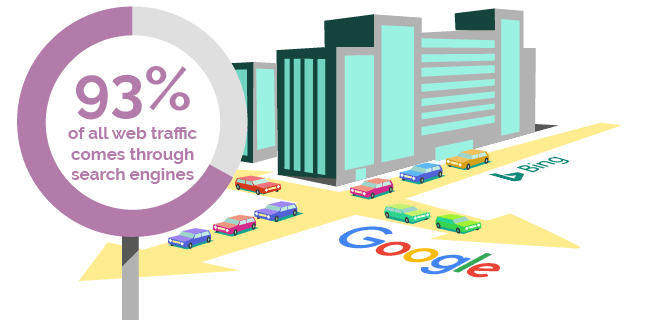
In the past, businesses would rely on word of mouth or telephone directories, such as the Yellow Pages to be found by prospective customers. Today, it is Google.
It doesn’t matter which industry you operate in, what services you provide, or what product you sell. Most potential customers will find you through Google, and through research.
Today’s searchers are savvy. They want to know what they are spending their money on, and whether it’s worth it. And so, they turn to search engines to find their answers.
This is where you can easily lose out to your competitors. They may rank higher in search engine results because they have dedicated time to their SEO as part of their marketing strategy.
If a search engine cannot easily find and understand your site, or does not deem it to be relevant, you will rank lower. In fact, you could risk not appearing in the rankings at all.
As a business, this could be detrimental, as you miss out on lots of traffic and potential customers.
Why You Need an SEO Strategy
Search engines today are much smarter than they used to be. However, they still require you to tell them who you are and the content you have.
That’s why you need to implement a detailed SEO and content marketing strategy. One which points them in the right direction for business growth.
The right SEO strategy can dramatically increase your site’s traffic. Not focusing on SEO will mean you don’t get noticed online.
How Can SEO Benefit Your Business?
The benefits associated with optimising your website for search engines are endless. Here are six key factors:
1. Increased Organic Traffic
Websites that appear at the top of search engines possess the lion’s share of web traffic; around 67% of all clicks.
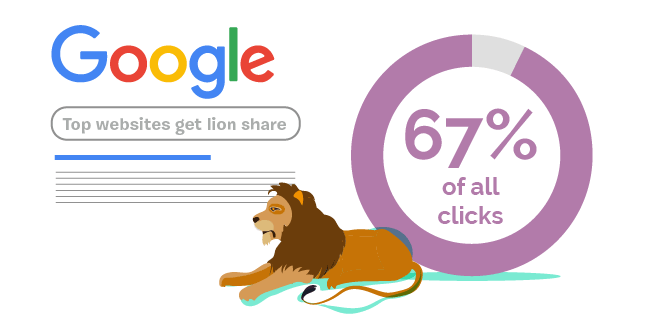
The higher up a website appears in search results, the more trust a consumer has that it’s a credible site. We as searchers tend to think ‘if it’s good enough for Google, then it’s good enough for me.’
So, appearing within the top five results on a search engine will massively increase your organic traffic.
2. Higher Return on Investment
The great thing about SEO, is that it can be measured.
There are lots of tools out there which track virtually every aspect of an SEO strategy. From your keyword research to your backlinks, they can be used to measure your SEO success and whether it’s working.
Using data from SEO analytics, you will be able to drill right below the surface into the core of your strategy. You’ll be able to see where your website traffic is coming from and whether customers are completing your desired user journey.
From here, you can tweak your plan to make your content better suit your target market.
3. Better User Experience
When the user has an excellent experience, they find it much easier to engage with your brand. They will likely want to learn more about you and the products or services you offer.
This behaviour is then inferred by Google. Who then deduct that your page is quality and relevant to that particular search query. As a result, they will rank you higher in the search results.
A huge part of SEO is about tinkering with your website and its architecture. This is in order to make individual pages more accessible to find, navigate and use.

As your rank increases for individual pages, you’ll also increase your overall domain authority. This makes it easier for Google to trust that your content is credible.
You’ll also be increasing your site visibility to more and more internet browsers. Not only will your site traffic improve but it will benefit your prospective customers too because they will be able to find you with much more ease.
4. 24/7 Exposure
Your website and its SEO rankings are the brand ambassadors that never sleep.
When you consistently rank high on Google, your website will be at the top of all relevant searches for 24 hours a day, 365 days a year.
SEO is not affected by variables such as time, day, interests or search history like other methods of marketing. When somebody performs a search query which relates to your business, product or service, you will show up right there and then.
5. Local Traffic
If you’re a brand with a physical local presence, then SEO can also help to drive traffic from this area to your site. This is called local SEO.
With the rise in the number of people using mobiles to conduct their searches, four in five consumers now use Google to find information about their local area. For instance, tourists might search for cafes and restaurants to visit whilst in the area.
These searches are typically more transactional and more successful for businesses, as the immediacy in using a mobile device to conduct a search is usually for people who wish to quickly find relevant information.
By taking the necessary steps to optimise your website for local SEO and appear high in the rankings, you’ll drive more visitors to your site. Many of whom will be looking to make an immediate purchase or find a service quickly.
The Importance of Off-Page SEO
Though your website’s content and other on-page ranking factors have a significant impact on your SEO, search engines also infer things that are not on your website too.

This is called ‘off-page SEO,’ and is all about the external factors that are not on your website but which indirectly impact your rankings.
Mentions on other websites and directories which form backlinks, as well as your meta information are just some of the off-page ranking factors you need to be aware of.
Just like on-page SEO, you can easily manage these things yourself. Though they are more time-consuming. This is due to the level of research and external communication needed to track and develop your off-page SEO.
Summary
SEO is the process of optimising your website and its content to rank in search engine results pages and reach a wider audience.
For any business with an online presence, SEO is an important part of your marketing strategy. It should make up part of your overall marketing plan.
It comes with a great range of benefits, including: increasing your organic traffic; receiving a high return on investment; improving your users’ experience; being low cost; and giving your website 24/7 exposure.
The process involves:
- The development of your on-page SEO
- Creation of high-quality and engaging content that addresses your target audience’s search queries
- Continual improvement of your website’s design
Off-page SEO is also an important factor, as search engines rely on citations from external sites to trust the reliability and authority of your website.
Hiring a Marketing Consultant to Deliver Faster Results
SEO is an ongoing process, and it’s a serious time investment for small businesses. Even when you reach the top, you’ll still have to consistently produce quality content to retain your position.
If you’re a small business without a full-time marketing team, you may struggle to find the time and resources needed to properly manage your SEO. And if you are managing it yourself, your time may be better spent elsewhere on growing your business.
With years of experience improving the rankings of companies across all sectors, my team and I can help you. We can develop and implement a comprehensive SEO strategy which will help deliver the best results for your business.
If you think you may want to outsource your SEO, or any other part of your digital marketing strategy, why not get in contact for an obligation-free chat.
It’d be great to see how we can help you to rank higher, increase your leads and drive the profits that your business deserves.
